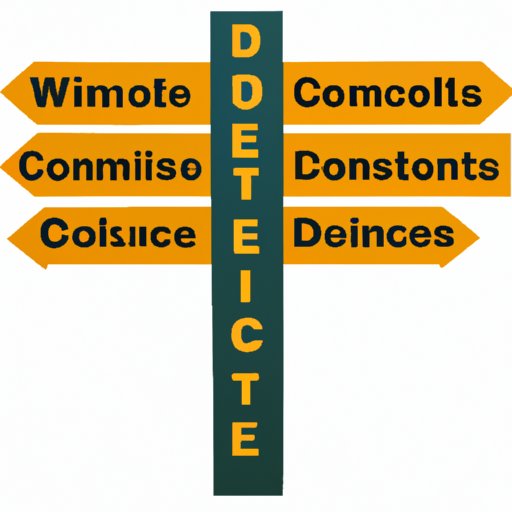Introduction
Indecisiveness is defined as the inability or unwillingness to make a decision. This can be a major source of stress and frustration, both for those who struggle with indecision and those around them. It’s important to make decisions in life, as they are necessary for growth and progress. When faced with a difficult decision, it can be helpful to use certain strategies to help you make the right choice.
Identify Your Core Values
When faced with a difficult decision, it can be useful to reflect on what is most important to you. According to clinical psychologist Dr. Sarah Schewitz, “Knowing your core values can help give you clarity when it comes to making decisions.” Identifying what matters most to you can help you determine which path is the best to take.
Tips for identifying your core values include making a list of qualities that you value, such as honesty, kindness, and trustworthiness. You can also think about what you would want your legacy to be. What do you want people to remember you by? Finally, consider the values of the people who have had the greatest influence on your life; what do they believe is important? Once you have identified your core values, it can help guide your decision-making process.
Consider the Consequences
With any decision, it’s important to consider the possible outcomes. Taking the time to think through the consequences of each option can help you make an informed decision. For example, if you are deciding whether or not to take a new job, you could consider the pros and cons of each option. How will this job affect your lifestyle? Will the salary be enough to cover your expenses? Will it allow you to pursue other interests? Answering these questions can help you determine if this job is the right fit.
You can also think about how each decision might impact your relationships. If you are deciding whether or not to relocate, you could consider how it would affect your family, friends, and other loved ones. Would you still be able to maintain those relationships, or would they suffer as a result of your decision? This can help you weigh the pros and cons of each option and decide which one is best.
Break Big Decisions Down into Smaller Ones
Big decisions can be overwhelming, so it can be helpful to break them down into smaller, more manageable chunks. For example, if you are deciding whether or not to go back to school, you could start by researching different schools and programs. Then, you could narrow down the list to a few options and visit each campus. After that, you could compare the costs and financial aid packages of each school. Breaking down the decision into smaller steps can help make it less daunting.
You can also apply this approach to everyday decisions. If you are trying to decide what to have for lunch, you could start by looking at the menu and narrowing down your choices. Then, you could consider factors like cost and healthiness. Finally, you could make your decision based on your preferences and goals. Breaking down the decision-making process in this way can help make it easier to reach a conclusion.

Seek Advice from Trusted Sources
Talking to someone you trust can offer an objective perspective when making decisions. Whether it’s a family member, friend, mentor, or therapist, having a supportive person to talk to can be invaluable. They can provide insight and advice while also offering a listening ear. They may even be able to point out something that you hadn’t considered.
It’s important to find someone who you trust and who has your best interests in mind. You may want to look for someone who has experience with the type of decision you are facing. For example, if you are deciding whether or not to start a business, talking to someone who has been successful in the same industry can be helpful. Seek out advice from someone who can offer an unbiased opinion and is willing to listen to your concerns.
Practice Making Quick Decisions
Making decisions quickly can be intimidating, but it doesn’t have to be. Start small by making quick decisions that don’t have a huge impact. For example, if you are trying to decide what to wear, you could pick out an outfit in five minutes or less. Or if you are trying to decide where to eat, you could choose a restaurant in two minutes. This can help you get used to making quick decisions and become more confident in your choices.
You can also practice making quick decisions in other areas of your life. For instance, if you are deciding whether or not to take a class, you could set a timer and make a decision within a certain amount of time. This can help you learn to trust your gut and make decisions without overthinking them. With enough practice, you will become more comfortable with making decisions quickly.
Conclusion
Indecisiveness can be frustrating and stressful, but it doesn’t have to be. By reflecting on your core values, considering potential outcomes, breaking down big decisions into smaller ones, seeking advice from trusted sources, and practicing making quick decisions, you can make decisions with confidence. Don’t be afraid to try out these tips and keep practicing—with time and effort, you can become an expert decision maker.
(Note: Is this article not meeting your expectations? Do you have knowledge or insights to share? Unlock new opportunities and expand your reach by joining our authors team. Click Registration to join us and share your expertise with our readers.)
